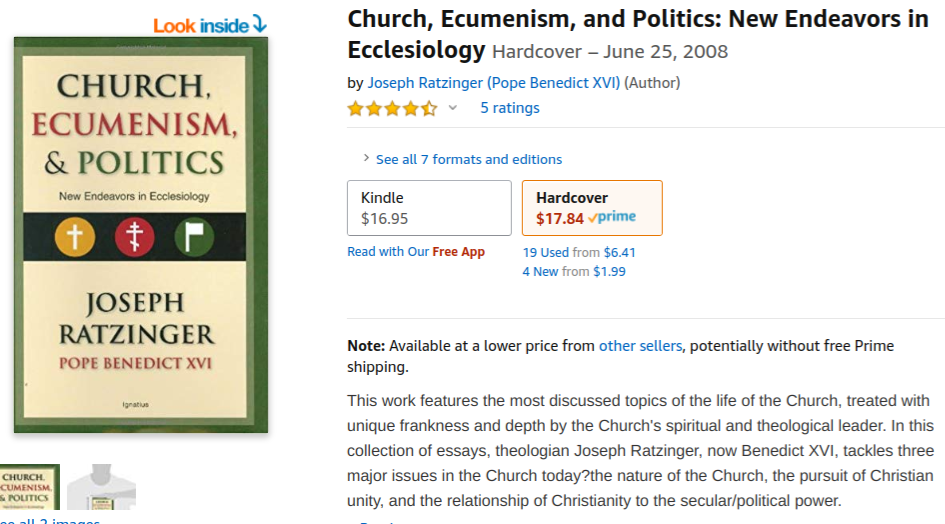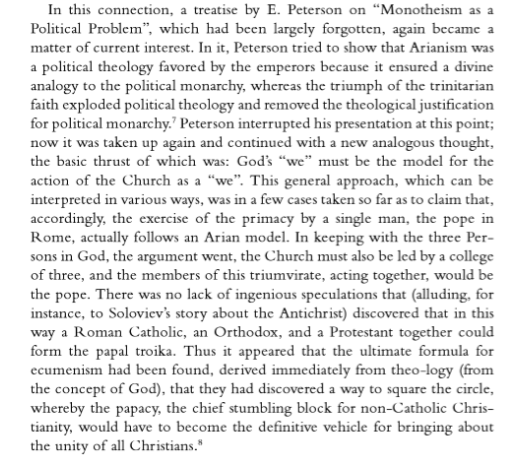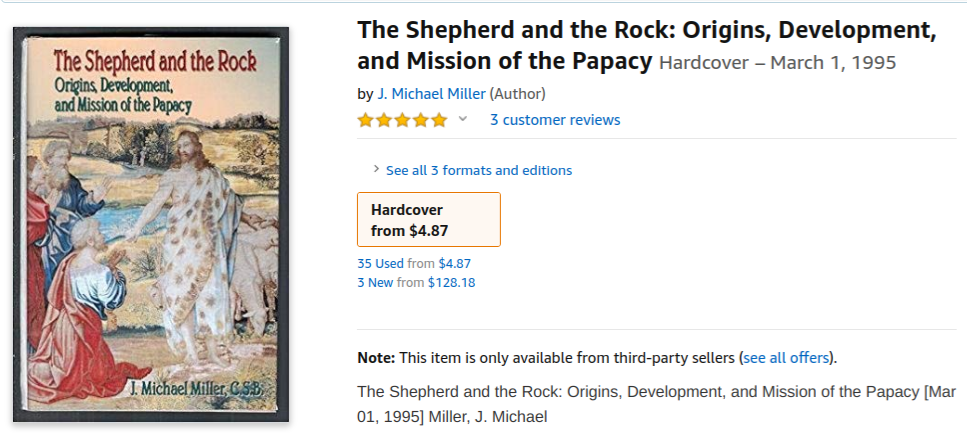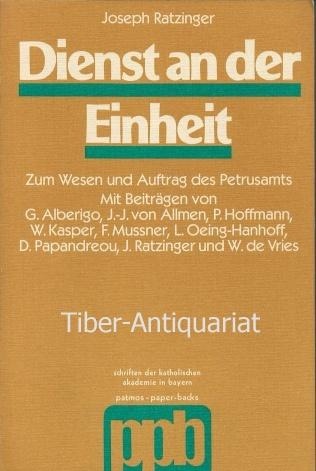What might the future hold, in terms of the form and function of the Papal Ministry? Turn to page 357:
Miller immediately goes on to support this thesis with a quote from Cardinal Ratzinger, Prefect of the CDF at the time:
I looked up the source, and indeed it is an official document of the CDF, signed by Ratzinger:
The topic at hand, obviously, is the possibility of changing the structure of the papacy, to meet the varying needs of the Church and its members, while maintaining the essential nature of the office.
This was Ratzinger’s dream, to somehow overcome the Petrine stumbling block for the sake of unity. And if changing the structure of the Petrine ministry was necessary, he was open to it.
(Ann adds: remember well that Ratzinger collected and edited the book of essays, one of which he wrote, on the future of the Papacy, “Dienst an der Einheit”, in which Ratzinger published Walter Kasper’s essay in which he said, “The present crisis of the papacy is one of legitimation.” As in, the Papacy is illegitimate as it stands, and it must be transformed. Ratzinger solicited, edited and published this under his banner.)
Back to the Miller book, page 358:
Ratzinger admits that “without a doubt there have been misguided developments in both theology and practice where the primacy is concerned.” A particular way of exercising the primacy might well have been the pope’s duty for the Church’s welfare at one time, without its being so in the future. In the words of Hermann Pottmeyer, “the present juridical and organizational form of the office of Peter is neither the best imaginable nor the only possible realization.”
Now let’s take a look at Cardinal Ratzinger’s 1997 book-length interview with Peter Seewald, Salt of the Earth:
Seewald: “Do you think that the papacy will remain as it is?”
++Ratzinger: “In its core it will remain. In other words, a man is needed to be the successor of Peter and to bear a personal final authority that is supported collegially. Part of Christianity is a personalistic principle; it doesn’t get vaporized into anonymities but presents itself in the person of the priest, of the bishop, and the unity of the universal Church once again has a personal expression. This will remain, the magisterial responsibility for the unity of the Church, her faith, and her morals that was defined by Vatican I and II. Forms of exercise can change, they will certainly change, when hitherto separated communities enter into unity with the Pope. By the way, the present Pope’s (JPII) exercise of the pontificate—with the trips around the world—is completely different from that of Pius XII. What concrete variations emerge I neither can nor want to imagine. We can’t foresee now exactly how that will look.”
Cardinal Ratzinger, Salt of the Earth, Peter Seewald book-length interview, 1997, page 257
“I neither can nor want to imagine.”
Oh man, how unknowingly prophetic is that? Then again, if you self-fulfill your own prophesy, is that cheating?
“Forms of exercise can change, they will certainly change”
He’s not exactly on the fence about it, is he?
Now let’s move to the following year, and another document written by Cardinal Ratzinger in his official role as Prefect of the CDF, The Primacy of the Successor of Peter in the Mystery of the Church, 18 November 1998:
At this moment in the Church’s life, the question of the primacy of Peter and of his Successors has exceptional importance as well as ecumenical significance. John Paul II has frequently spoken of this, particularly in the Encyclical Ut unum sint, in which he extended an invitation especially to pastors and theologians to “find a way of exercising the primacy which, while in no way renouncing what is essential to its mission, is nonetheless open to a new situation”…
“The pilgrim Church, in its sacraments and institutions, which belong to this age, carries the mark of this world which is passing”.44 For this reason too, the immutable nature of the primacy of Peter’s Successor has historically been expressed in different forms of exercise appropriate to the situation of a pilgrim Church in this changing world…The Holy Spirit helps the Church to recognize this necessity, and the Roman Pontiff, by listening to the Spirit’s voice in the Churches, looks for the answer and offers it when and how he considers it appropriate.
Consequently, the nucleus of the doctrine of faith concerning the competencies of the primacy cannot be determined by looking for the least number of functions exercised historically. Therefore, the fact that a particular task has been carried out by the primacy in a certain era does not mean by itself that this task should necessarily be reserved always to the Roman Pontiff… (ahem, you mean like delegating the Governance role without relinquishing the Office, per Canon 131.1?)
In any case, it is essential to state that discerning whether the possible ways of exercising the Petrine ministry correspond to its nature is a discernment to be made in Ecclesia, i.e., with the assistance of the Holy Spirit and in fraternal dialogue between the Roman Pontiff and the other Bishops, according to the Church’s concrete needs. But, at the same time, it is clear that only the Pope (or the Pope with an Ecumenical Council) has, as the Successor of Peter, the authority and the competence to say the last word on the ways to exercise his pastoral ministry in the universal Church.
Joseph Cardinal Ratzinger,Prefect, CDF, Primacy of the Successor of Peter in the Mystery of the Church (published in L’Osservatore Romano, Weekly Edition in English, 18 November 1998, page 5-6) HERE
But wait! There’s more:

It’s 2008 and Ratzinger is now Pope Benedict XVI. This collection of essays, in various forms, goes back to 1987. The 2008 edition was translated by our new friend, Archbishop Miller. Turn straight to page 38 to read Benedict waxing poetic about the idea of not one, not two, but THREE members in an expanded Petrine ministry. He literally uses the term “papal troika.”

***Talk about shifting the Overton Window. How about having a book published after you’ve become pope, introducing the radical idea of a papal troika as being plausible, and then pulling back to the slightly less radical idea of a diarchy, making the latter seem positively moderate by comparison.***






